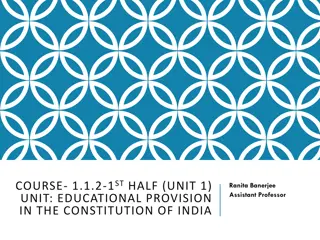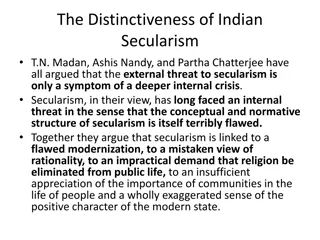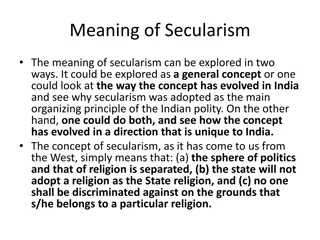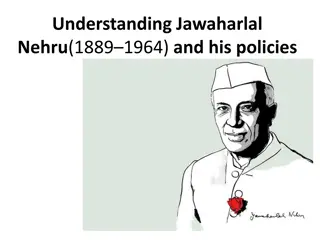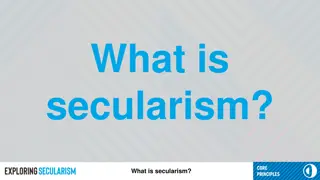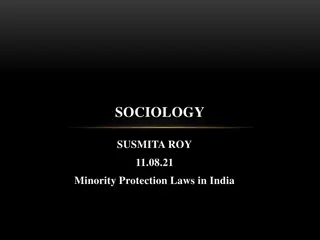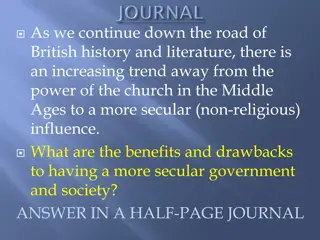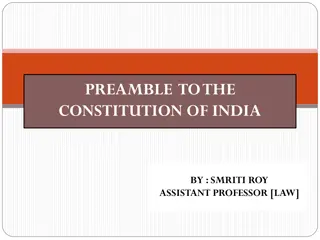Exploring Nationalism, Universalism, and Secularism in Education: Insights from Tagore and Krishnamurty
Delve into the profound concepts of nationalism, universalism, and secularism in education as elucidated by Dr. V. Regina, Principal at CSI Bishop Newbigin College of Education. The content explores the meanings, philosophies, and celebrations associated with these ideologies, drawing perspectives f
0 views • 22 slides
Understanding Secularism: Principles and Advantages
Secularism is the principle of separating government institutions from religious entities to ensure equal rights for believers and non-believers. It safeguards freedom of religious belief and practice, upholds religious freedom, and promotes democracy and fairness. Secularism aims to prevent religio
0 views • 21 slides
Educational Provisions in the Constitution of India
The Constitution of India, adopted in 1949, serves as the supreme law outlining the fundamental structure, government institutions, rights, duties of citizens, and more. It emphasizes sovereignty, socialism, and secularism, establishing India as an independent, democratic, and inclusive nation.
0 views • 41 slides
America's Founding Ideals: A Historical Perspective on Religion and Governance
The history of America's founding reflects a diverse interplay between Puritanism and Deism, influencing the country's governance and religious landscape. Rooted in principles of faith and secularism, the nation's journey sheds light on the evolution of beliefs and compromises in shaping its constit
0 views • 68 slides
The Distinctiveness of Indian Secularism: A Critical Analysis
T.N. Madan, Ashis Nandy, and Partha Chatterjee argue that Indian secularism faces an internal crisis due to flaws in its conceptual structure. However, Prof. Rajeev Bhargava contends that Indian secularism is distinct and balances religion and state through contextual moral reasoning. The debate cen
7 views • 4 slides
Evolution of Secularism: From Europe to India
Secularism, originating from the West, advocates for the separation of politics and religion, ensuring the state doesn't favor any religion while safeguarding individual rights. In Europe, religious wars prompted the adoption of toleration principles. The Enlightenment era in Europe paved the way fo
0 views • 5 slides
Jawaharlal Nehru: Visionary Leader and Architect of Modern India
Jawaharlal Nehru, a prominent leader of India's nationalist movement, played a crucial role in shaping the country's policies post-independence. As India's first Prime Minister, he focused on pillars like democracy, socialism, secularism, and nationalist unity. Nehru's domestic policies emphasized s
0 views • 8 slides
Understanding Secularism: Balancing Freedom of Religion
Secularism encompasses a range of ideas aimed at balancing freedom of and from religion with other rights. It advocates for the separation of religious institutions from state institutions to prevent discrimination and privilege based on religious beliefs. Secularism emphasizes the neutrality of the
1 views • 22 slides
Minority Protection Laws in India: Safeguarding Diversity
India's rich diversity poses the need for robust laws to protect minority communities, ensuring their rights and safeguarding their customs. The Constitution of India upholds secularism and equality, providing provisions to safeguard minority rights and prevent discrimination based on religion, cast
1 views • 19 slides
Understanding Moral and Constitutional Values in Relation to Judiciary
Explore the concepts of moral values and constitutional values, emphasizing their importance in decision-making processes and societal norms. Discover the stages of moral development and delve into constitutional values such as sovereignty, socialism, secularism, democracy, justice, liberty, equalit
0 views • 9 slides
Challenges to Religious Freedom in India: An Overview
India, as the world's largest democracy with a tradition of secularism, faces escalating challenges to religious freedom and civil society. The BJP-led government's Hindu nationalist agenda has led to systematic violations of religious rights, targeting minorities and activists. The tightening grip
0 views • 20 slides
The Shift from Church to Secular Influence in British History
The transition from church-dominated governance to a more secular society in British history brought both benefits and drawbacks. While secularism promoted intellectual freedom, scientific advancement, and rationality, it also led to conflicts between traditional beliefs and new ideas, as seen in th
0 views • 11 slides
Understanding the Fertile Ground of Cultural Influences on Religious Movements
Cultures provide fertile soil for diverse religious movements due to various factors such as secularism, existential uncertainties, disillusionment with leaders, and a deep human longing for transcendence. Other contributing factors include breakdown of traditional social structures, moral relativis
0 views • 13 slides
Avehi Abacus Project 1990-2018: Strengthening Education Through Interactive Learning
Avehi Abacus Project, founded in 1990 by Avehi- Audio Visual Education, aims to enhance primary school education by promoting interactive discussions through stories and games. The project emphasizes values of equality, justice, gender parity, secularism, and environmental sustainability. Sangati, o
0 views • 21 slides
Overview of the Preamble to the Constitution of India
The Preamble to the Constitution of India serves as a concise introduction, outlining the foundational principles and objectives of the nation, including sovereignty, socialism, secularism, democracy, justice, liberty, equality, and fraternity. It reflects the vision of the framers and sets the tone
0 views • 15 slides


